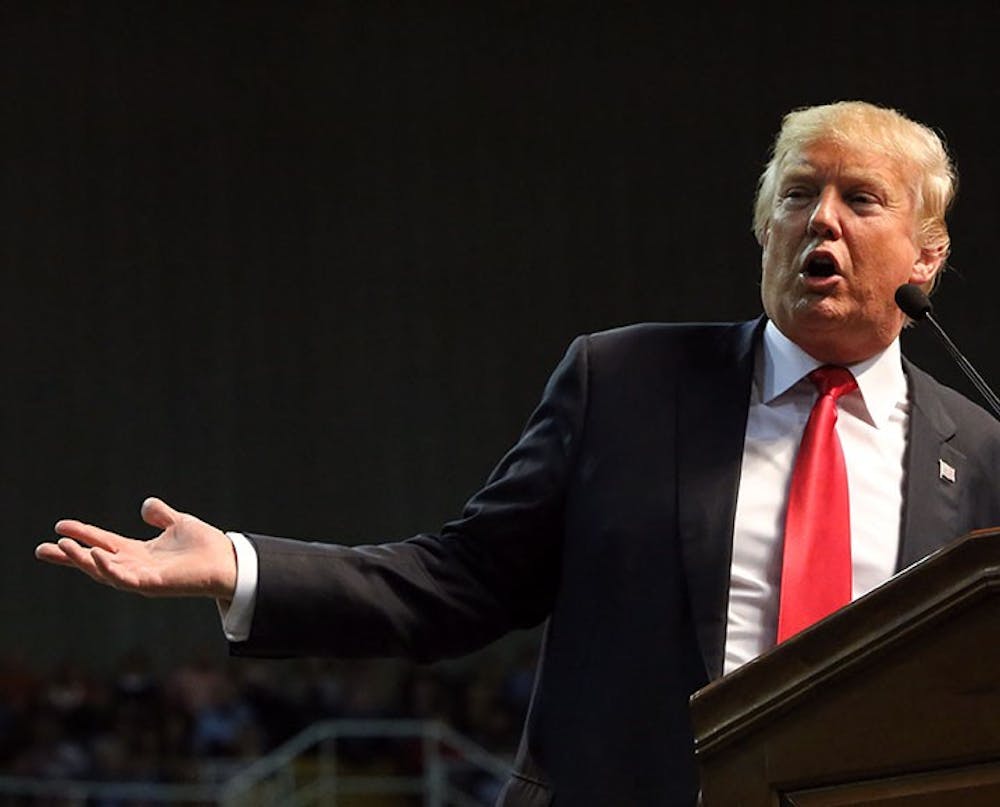It’s time for the Republican Party to start freaking out.
I speak of course of the seemingly unstoppable campaign of businessman Donald Trump in the race for the Republican presidential nomination. Trump has won three out of the first four contests, including the primary here in South Carolina, and looks poised to win most of the 11 primaries and caucuses on Super Tuesday.
Trump has taken the nation by storm, sweeping across the country and holding huge rallies — including one at USC back in September. His seemingly unique brand of populism, personality and not-so-veiled xenophobia has led to rabid supporters and an air of invincibility.
The thing is, he’s not so unique.
Pundits and political experts have searched for an explanation to the Trump phenomenon, or at least some sort of context through which to view his extraordinary campaign. Many have settled on the example of George Wallace, the iconic Alabama governor who ran as a third-party candidate for president in 1968.
In an interview with BuzzFeed, former South Carolina State Sen. Tom Turnipseed, who managed Wallace’s campaign, explained why he sees parallels between the two candidates. “Both of them use a lot of the same kind of scare tactics and fear,” he said.
Wallace was first made famous as the hard-line segregationist governor of Alabama, where he physically blocked National Guard troops from integrating the University of Alabama in the famous “stand in the schoolhouse door” in 1963.
By 1968, Wallace had become a national figure known for fiery rhetoric and a lack of political correctness. His third-party candidacy for president shook up the political establishment and uncovered a deep vein of hatred and unrest in the white working-class population.
Wallace became known for heated rallies where he would confront opponents. In one notable instance, he threatened to run over protesters with his car. Trump also likes to threaten those who interrupt at his rallies. “I’d like to punch him in the face, I’ll tell you that,” he said of one protester in Nevada. Trump claimed in the “good old days,” protesters would “be carried out on a stretcher.”
Maybe he was referencing the days in October 1968, when Wallace rallies erupted in riots between protesters and supporters and where punches were thrown and chairs flew.
Wallace also became known for attacks on the press, a theme that Donald Trump has continued with great aplomb.
But Wallace was most famous for his sharp racism. In his 1963 inaugural address, he famously claimed he would stand for “segregation now, segregation tomorrow and segregation forever.”
Trump has said many offensive things this campaign. He has attacked illegal immigrants as rapists, impugned the service record of a POW, suggested a female debate moderator was menstruating, mocked a disabled reporter and proposed banning all Muslims from the United States.
But this past weekend, Trump went ever further beyond the pale. When asked about his habit of retweeting white supremacists and his growing list of endorsements from white supremacist groups, Trump refused to condemn the Ku Klux Klan and noted white supremacist politician David Duke.
Now, since then Trump has walked back his statement, noting that he has condemned Duke and the KKK in the past. However, the troubling racial undertones of his campaign have now risen into a full-scale reincarnation of Wallace’s 1968 run.
It’s a reminder of the so-called “southern strategy” — the subtle plays to racism that the Republican Party adopted under the direction of Lee Atwater, a South Carolina political legend who rose to become chairman of the Republican National Committee. The southern strategy was implemented, in part, as a response to Wallace's success.
In 1980, it led to Ronald Reagan beginning his campaign in Philadelphia, Mississippi, by pledging to uphold states rights. The town had been made famous when civil rights workers were murdered there in 1964.
In 1988, it led to campaign advertisements showing a black prisoner scowling menacingly and implying that Democratic candidate Michael Dukakis would allow black criminals free reign.
In 2000, rumors spread in South Carolina that John McCain had fathered a black child out of wedlock, toppling his lead in the polls and his chances at the nomination.
And in 2011, Trump played on racism when he demanded that the nation’s first black president release his full birth certificate.
So subtle (and sometimes not so subtle) racism is nothing new in Republican politics. And Trump’s behavior is not altogether new in American politics across the board. But it’s certainly disturbing to see this behavior resurface.
To be fair to the Republican Party, their leaders, including Gov. Nikki Haley, have condemned Trump's KKK remarks. But that doesn't mean the voters do.
At a Trump rally on Sunday in Alabama, a NPR reporter asked a Trump supporter about the KKK controversy and noted the lack of black people in the crowd. “The problem is the black people in America,” the man replied. “American blacks are unsophisticated in understanding that they need to make people earn their vote.”
In 1968, George Wallace won five states: Arkansas, Louisiana, Mississippi, Alabama and Georgia.
Trump looks to earn lots of votes in three of those five states, which vote on Super Tuesday.

